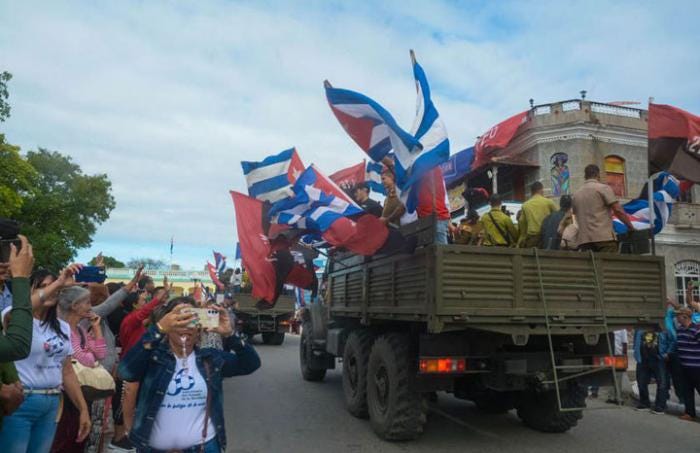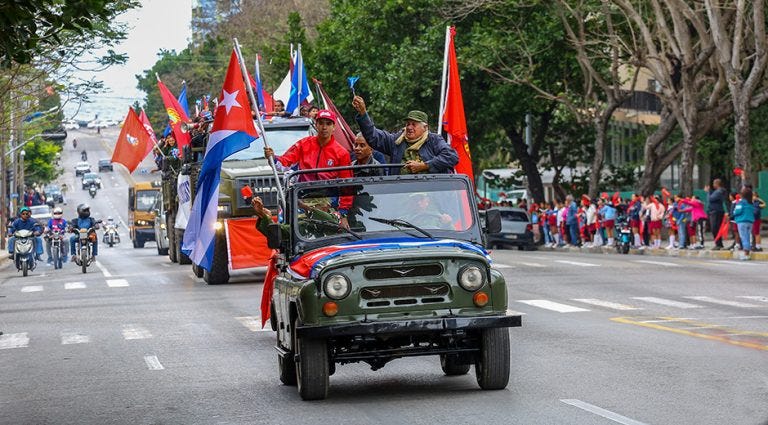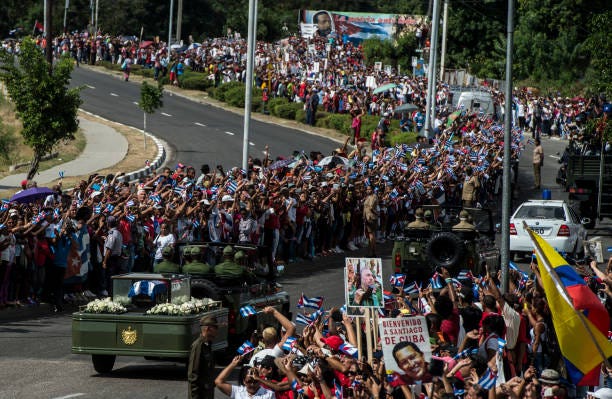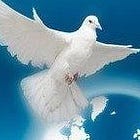The Caravan of Freedom in Cuba
An annual reenactment and celebration of the revolutionary taking of power

The Cuban Revolution triumphed on January 1, 1959, five and one-half years following the attack on Moncada Barracks, on July 26, 1953, and the announcement by Fidel of a new stage of war in a revolution for independence and sovereignty that was initiated in 1868, and after two years of armed struggle from the Sierra Maestra. In the face of the territorial advances of the rebel army, Cuban dictator Fulgencio Batista fled the country in the early morning hours of January 1. Fidel and his guerrilla column entered Santiago de Cuba, where he gave his first open address to the people. A Provisional Revolutionary Government was formed on January 1-2, and on January 2, Fidel and his troops moved westward toward the capital city of Havana in a triumphant caravan of jeeps, cars, trucks, and military vehicles. In Bayamo, 2,000 soldiers of the central Army post in the region were incorporated into the revolutionary army. As the caravan moved through the provincial capitals along the central highway, Fidel directed a detour toward Cienfuegos, to greet the people who had launched an uprising on September 5, 1957; and another detour to the city of Cárdenas, to place flowers on the tomb of José Antonio Echeverría, who was killed leading an assault by students on the Presidential Palace on March 13, 1957. In Camagüey, Santa Clara, Catalina de Güines, and San José de las Lajas, the warm embrace of the people delayed the advance of the rebel army, as the people proclaimed the right to see and listen to the head of the Revolution.
Fidel and the caravan arrived in Havana on January 8. The people took to the streets to welcome the rebels. Cuban flags and the red and black colors of the July 26 Movement hung from the balconies and windows; women were dressed in the same colors. The guerrillas of the rebel army, many of whom were from the countryside and had never seen the city of Havana, smiled timidly behind their legendary beards. Church bells, car horns, and ship sirens were heard constantly. Both sides of the streets were filled with people. International journalists, some of whom had previously covered the welcoming of generals Eisenhower and MacArthur at the end of World War II and the fall from power of dictatorships in Argentina, Colombia, and Venezuela, declared that they had never seen such an extraordinary spectacle.
The caravan arrived at the Presidential Palace, where Fidel was greeted by Provisional President Manuel Urrutia Lleó and the ministers of the Provisional Revolutionary Government. Fidel spoke to the assembled crowd, and he asked them to open a file, where he and the President could walk, so that the world would see that the revolutionary leaders do not need armed guards to walk among the people. And he called upon them to go en masse to the Columbia military camp, headquarters of the Joint Chiefs of Staff of the armed forces of the dictatorship.
The caravan then proceeded to the Columbia military camp, where Fidel accepted the formal surrender of the armed forces of the dictatorship, many of whom were to be incorporated into the Revolutionary Armed Forces. As Fidel spoke to the assembled crowd, white doves landed on his shoulders, welcoming his arrival. Inasmuch as it was past midnight, it was proposed that Fidel spend the night in the military camp, which days before had been the residence of Batista. Fidel declined, and moved instead to the Hotel Palacio, a modest establishment in Old Havana where he had lodged in his days as a university student.
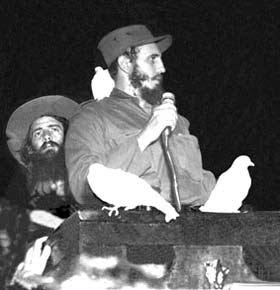
Each year, Cuban youth reenact the Caravan of Freedom, traveling in military vehicles across the island from January 2 and to January 8, with commemorative events held in the various places where the caravan stopped in 1959; culminating on January 8 with the arrival to the former Colombia military camp in Havana, today an educational complex known as Freedom City.

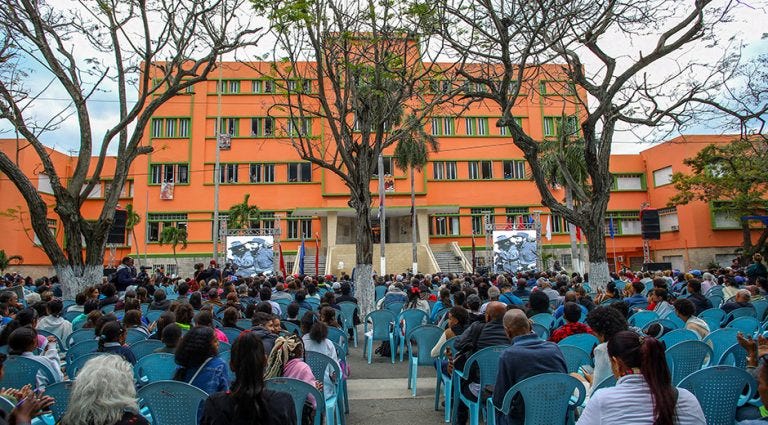
§
Fidel declares: The Revolution begins now; what lies ahead will not be easy
In Santiago de Cuba on January 1, Fidel spoke at Parque Céspedes, addressing the people from a balcony of a hotel facing the park. He declared, “People of Santiago; Fellow patriots of all of Cuba: Finally, we have arrived to Santiago. The road has been hard and long, but we have arrived. . .. The Revolution begins now. The Revolution will not be an easy task. The Revolution will be a hard enterprise, full of dangers, especially in this initial stage.”
Fidel described to the people the developments of the previous twenty-four hours. An agreement was made with General Eulogio Cantillo, chief of the Joint General Staff of the armed forces of the dictatorship, for a cease fire that was to take effect on December 31 at 3:00 p.m. The agreement also stipulated the unconditional surrender of the military garrison of Santiago de Cuba, with the possibility of honorable military personnel joining the rebel army. With this agreement in place, the rebel forces suspended their planned attack on Santiago de Cuba. However, a few hours before the implementation of the cease fire, Cantillo sent Fidel a message saying that the circumstances had changed. He was referring to a coup d’état in Havana, conducted by persons who did not pertain to the revolutionary movement, which named a new president of the Republic, ignoring the fact that the revolutionary organizations had already agreed on the naming of the President of the Supreme Court, Dr. Manuel Urrutia Lleó, as president. Fidel therefore informed the military chief of the Plaza of Santiago de Cuba that, because the agreement is not being carried out, the rebel forces would be compelled to attack the Plaza. Fidel noted that Army Colonel José Rego Rubido is to be credited with avoiding a bloody battle, because he traveled by helicopter to locate and meet with Fidel, and he placed the armed forces at the unconditional disposition of the rebel army. Following the meeting with Cantillo, Fidel called a meeting of the 100 Army, Naval, and police officers of the Plaza of Santiago de Cuba, in which it was agreed that they would not recognize the rigged coup in Havana, and they would give their support to the provisional revolutionary government being established, because it has the support of the majority of the people. In his January 1 address at Parque Céspedes, Fidel announced that Judge Manuel Urrutia Lleó would take possession of the provisional presidency of the Republic later in the day.
Fidel further declared:
This taking of power has not been the fruit of politics; it has been the fruit of the sacrifice of hundreds and thousands of our peasants. There is no commitment other than that with the people and the Cuban nation. A man arrives to power without a commitment to anyone, except with the people, exclusively.
. . . .
We do not believe that all the problems are going to be resolved easily. We know that the road is full of obstacles, but we are men of faith, who always face the great challenges.
The people can be sure of one thing, and that is that we might be wrong on many occasions, but the one thing that no one ever will be able to say of us is that we rob, that we betray, that we make crooked deals. . .. And I know that the people will forgive us for errors and will not forgive shameless acts of ill will.
. . . .
Never will we let ourselves be pulled by vanity or ambition.
. . . .
The whole of America is watching the course and the destiny of this Revolution. All of America has eyes on us, all accompany us with the greatest desires of triumph, and all will back us in our difficult moments. This happiness today not only is in Cuba, but in the whole of America. As we have been happy when a dictator in Latin America falls, they also are happy today for Cubans.
. . . .
I ought to warn the officials of the dictatorship, the representatives and the senators, not those that have not robbed, but those that have charged payments: they will have to return to the last cent what they have charged in these four years. Because they have charged illegally, and those senators and representatives will have to return to the Republic the money that they have charged. And if they do not return it, we will confiscate their properties, aside from what they have robbed, so nothing will remain of what they have robbed. That is the first law of the Revolution. It is not right to send to prison a man that has robbed a chicken or a peacock, while those that have robbed millions of pesos are enjoying life somewhere.
. . . .
Temporarily the need for arms has ceased. The arms will be guarded where they will be within the reach of the men that will have the duty to defend our sovereignty and our rights. But when our people are threatened, not only will 30,000 or 40,000 members of the Armed Forces fight, but 300,000, 400,000, or 500,000 Cubans, men and women, are able to fight. They will have the necessary arms, so that all who want to engage in combat are armed, when the hour of defending our sovereignty arrives.
It has been demonstrated that in Cuba not only the men fight, but the women also. And the best proof is the “Mariana Grajales” squad, which distinguished itself in numerous combats. The women are soldiers as excellent as our best soldiers among the men.
I wanted to demonstrate that women could be good soldiers. At the beginning, the idea provoked much resistance, because there were many prejudices, and there were men that said that while there were men with a shotgun, a rifle should not be given to a woman. And why not? . . . . We organized the units of women, and they demonstrated that women are able to fight. When in a people the men can fight and the women can fight, that people is invincible.
Fidel concluded his January 1 speech by reiterating that Dr. Manuel Urrutia Lleó will take possession of the provisional presidency of the Republic, and that Fidel will assume the functions that he assigns.1
Fidel arrived at the Columbia military camp in Havana, today known as Freedom School City, on January 8, 1959. In what became known as “the speech of the doves,” he declared:
I know that speaking tonight here presents me with one of the most difficult obligations, perhaps, in this long process of struggle that was initiated in Santiago de Cuba on November 30, 1956.2
The people are listening, the revolutionary combatants are listening, and the soldiers of the Army are listening, whose destiny is in our hands.
I believe that this is a decisive moment in our history: the dictatorship has been overthrown. Happiness is immense. However, much remains to be done. We ought not deceive ourselves into believing that what lies ahead will be easy; perhaps all that lies ahead will be more difficult.
To speak the truth is the first duty of all revolutionaries. To deceive the people, to awaken false hopes, always brings the worst consequences, and I consider that the people should be alert against the excess of optimism.
How did the Rebel Army win the war? Speaking the truth. How did the dictatorship lose the war? Deceiving the soldiers.
. . . .
A distance has been walked, perhaps a considerable step forward. Here we are in the capital; here we are in Columbia. The revolutionary forces appear victorious. The government is constituted, recognized by numerous countries of the world. It appears that peace has been attained. However, we ought not to be optimistic.
While the people laugh today, while the people are happy, we are worried. The more extraordinary the multitude that turned out to receive us, and the more extraordinary was the jubilation of the people, the greater was our preoccupation, because the greater was our responsibility before history and before the people of Cuba.
. . . .
The President of the Republic has entrusted me with the most difficult task of all, the task of reorganizing the military institutions of the Republic, and he has assigned me to the charge of Commander in Chief of all the air, sea, and land armed forces of the nation. . . . That is a sacrifice for me. That charge for me is not a reason for pride nor vanity. It is for me a sacrifice. But I want the people to tell me that they believe that I ought to assume that function (“Sí!”).
. . . .
In addition, all revolutionary combatants that desire to belong to the regular armed forces of the Republic have the right to belong to the organization to which they belong, with their ranks. . . . The doors are open for all the revolutionary combatants that want to struggle and that want to do a task for the benefit of the country.
. . . .
The arms have to be in the barracks. No one has the right to raise private armies here.
. . . .
The President of the Republic, with the right that corresponds to him—because he was chosen without conditions—has selected a majority of ministers from the July 26 Movement. He had this right, and on asking our collaboration, he received it fully. We take responsibility with that Revolutionary Government.
. . . .
What is important, or what needs to be said, is that I believe that the acts of the people in Havana today, the multitudinous mass concentrations of today, that mass of people kilometers long—because this has been astonishing, you saw it, and it will come out in the films and photographs—I believe, sincerely, that it has been excessive of the people, because it is much more than we deserve (“No!”).
In addition, I know that never again in our lives will there be such a mass concentration of people, except on one occasion—even though I am sure that there will be many mass gatherings—and that is the day that we die, when they have to take us to the tomb, on that day again will gather as many people as today, because we never will defraud our people!
Fidel’s concluding premonition of his death was confirmed by the extraordinary demonstration of affection by the people across the island at the time of his death on November 25, 2016, as the casket carrying his ashes were transported from Havana to their final resting place in Santiago de Cuba, retracing in reverse the route of the Caravan of Freedom. Many lifted the sign, “Promise delivered.”
A free subscription option is available, with capacity to read, send, and share all posts. A paid subscription ($5 per month or $40 per year) enables you to make comments and to support the costs of the column; paid subscribers also receive a free PDF copy of my book on Cuba and the world-system. Ten percent of income generated through subscriptions to the column is donated to the Cuban Society for Philosophical Investigations.
Deepen your understanding of people’s democracy, a post-bourgeois form of democracy necessary for our times:
People’s Democracy in Cuba: A vanguard political-economic system
Fidel initially did not assume a position in the cabinet of ministers in the Provisional Revolutionary Government; however, he remained in command of the Revolutionary Armed Forces. In the first weeks following the triumph of the Revolution, Fidel informally met with the people to assess their desires. Fidel appears to have had a genuine desire to not enter the cabinet of ministers, preferring instead to fulfill various specific tasks in defense of the Revolution. However, in February, Fidel was approached by members of the Provisional Revolutionary Government, who asked him to assume the position of Prime Minister, because the government was not functioning as well as it should, and it was in need of decisive leadership. Fidel assumed the position of Prime Minister on February 16, 1959.
November 30, 1956, was the date of the initiation of the guerrilla war. On that date, an uprising in Santiago de Cuba was initiated, organized by Frank País. The uprising was designed to provide support for the arrival in the yacht Granma of an expedition of eighty-two guerrilla soldiers led by Fidel, which had been training in Mexico.


